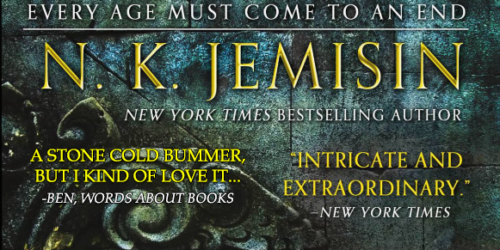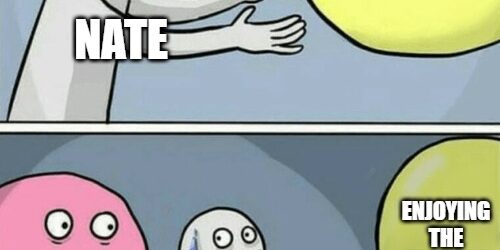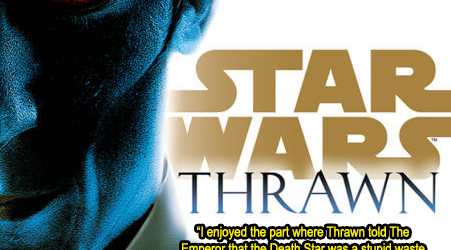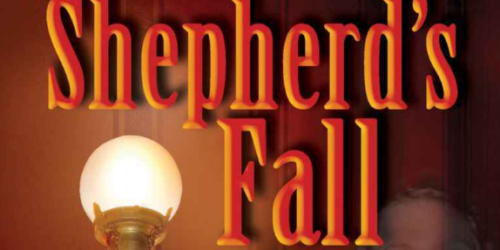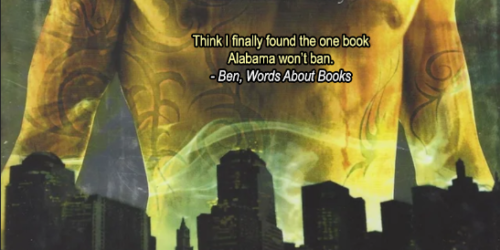Ben Reviews: A Dirty Job by Christopher Moore

I initially read this book in 2008. I was 20-years old. I remember liking it when I read it. This is one of the most well-read paperbacks I own from all of the friends I’ve lent it to over the years. I never considered it a perfect book, but I’m really surprised how much my opinion of the book has changed for the negative over the course of 15-years.
I expected this re-read to be a pleasant trip down memory lane. Sure, there were bound to be some jokes that didn’t age well, but I honestly expected this to be an easy 4-stars. Apparently I’ve grown a lot as a person since those college days, because I wound up struggling to even finish the book.
In the time since I first read A Dirty Job, my brain whittled the story down to a narrative about a man who learns to cope with the loss of his wife by becoming a charmingly befuddled personification of Death. What I had forgotten was how lazy (and what a large percentage of the page count) the humor was. Christopher Moore has the capacity to write decent comedy. There are scenes in this book where established characters find themselves in funny scenarios where the humor evolves naturally from the situation without a need for anyone to say “fuck puppet”, but they’re rare. For example, the punchline of most of the jokes involving the character Minty Fresh is that he is large and/or black. He bumps his head on a low ceiling. People find his skin to be quite dark. The punchline of basically every joke involving Mrs. Ling is that she’ll eat any animal because she’s Chinese. The list goes on and on.
A lot of times the book crosses the line for me with the race jokes and the misogyny. I really started to find the Mrs. Ling bits offensive. I don’t really like the way that Lily is…to put it charitably…taken advantage of repeatedly by much older men who have known her since she was a teenager, and that’s funny…I guess? But look, I understand that comedy is supposed to be transgressive. It wasn’t an overwhelming desire for social justice that fueled my dislike of the book. It was how boring it all was.
In this 380+ page book, Christopher Moore repeatedly makes the observation that the main character’s lesbian sister is a lesbian who dates women and doesn’t dress in a traditionally feminine manner. Every time Jane is wearing a suit I’m supposed to be laughing because suits are for men? I guess? I honestly don’t even know what he was trying to do. Or the fifth time Mrs. Ling eats something that’s not Chicken, Beef, Pork, or Lamb I’m supposed to be rolling cause that’s unusual in my culture (Except it’s not. I grew up in an area where half the school didn’t show up on the first day of small game season).
Moore spends so much time trying to perfect his tight five for open mic night between plot points that he basically forgets to write most of the story until literally the last 50-pages. In the last 50-pages of this book the main character meets the love interest, falls in love, learns who his enemy is, starts the final battle, learns he is not the chosen one, finishes the final battle, and dies. None of that struck the author as something that might have needed a little time to breathe. Which brings me to what the core of this book actually is.
Charlie Asher, our main character, is a beta male. Now, this is the bit of the story that has probably aged most like milk and it is, unfortunately, most of the story. In 2006, red-pilled incels had not yet achieved mainstream notoriety. A frightening amount of the page count of this book is expositing on the various evolutionary strategies of the beta male. I doubt Christopher Moore could have anticipated how seriously certain people would take that shit in the present day. It is one of the weakest and most annoying jokes in the entire story, and like every other aspect of the story, is wildly inconsistent.
Charlie is neurotic. Charlie is crippled by anxiety. Charlie walks right up to people and makes fun of them to their face, including heckling a cop who is arresting him (on multiple occasions). Charlie will attempt to beat the shit out of people who he believes have wronged him. Charlie literally fights demons with a sword. Charlie is a Mr. Bean-esque moron. Charlie shares deep insights into the human soul, specifically around the grieving process.
After a certain point in the book, every character begins to sound the same. They all become the same sarcastic, ironically detached, San Franciscan hipster. Occasionally, the book will shift gears dramatically and tell a very realistic and very relatable (with the exception of the hard drug use, the book really tries to normalize popping opioids that weren’t prescribed to you) portrayal of death and hospice care. It’s very apparent when Christopher Moore is writing from some actual conversation he’s had with a dying person or hospice worker because the tone of the book radically shifts and the main character becomes a literal sage despite having shown zero capacity for that level of introspection…or basic critical thinking…at any other point in the story.
I could go on, but I’d better stop before I wind up with a 380-page mess. Long story short, wouldn’t recommend the book and I am now questioning my impression of every book that I read before the age of 30.
Rubric
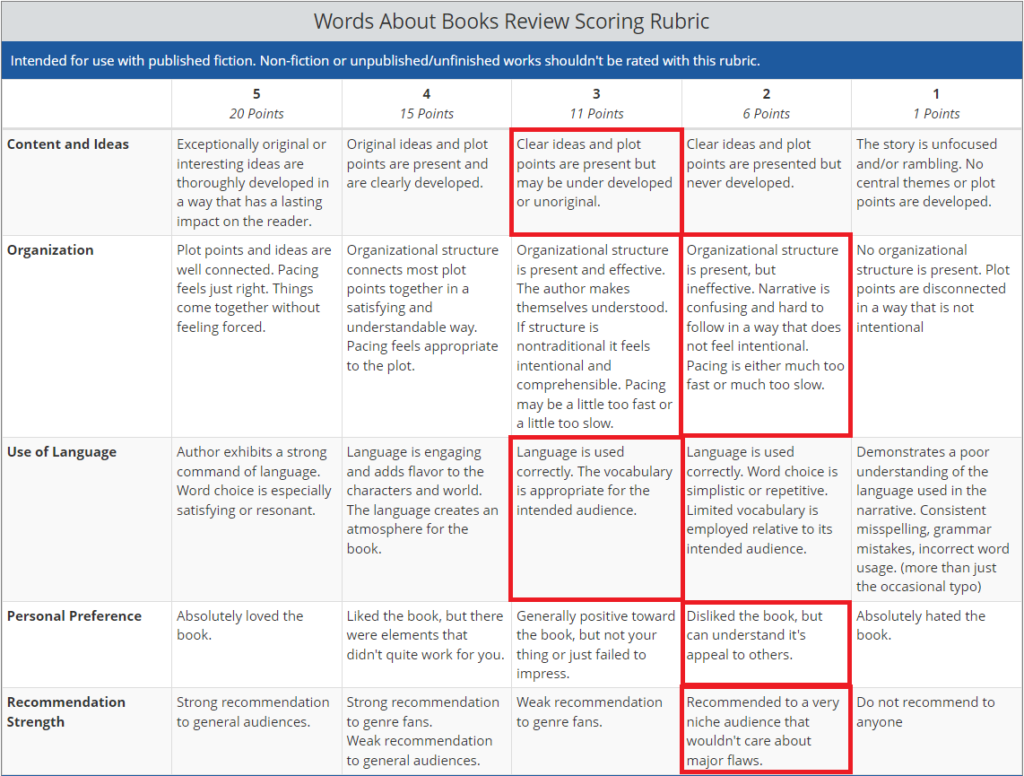
Content and Ideas 3/5: The ideas and plot are original and have a lot of potential, but Moore is frustratingly uninterested in developing them beyond a certain point. Moore seems to believe that it is more entertaining for Charlie to be eternally confused than for the audience to understand what is happening. That’s probably true for many, but not for me. For example, I still don’t understand precisely what Sophie is.
Organization 2/5: The ratio of standalone jokes and witty observations to plot movement is way out of proportion. The book will stop dead to explain how a beta male invented fire and an alpha male invented the third degree burn. If the book was about being a beta male maybe it shouldn’t also have been about grief and death. All of these asides are contradictory and take away from the book as a whole.
Use of Language 3/5: I am begrudgingly giving this a 3, but I wanted to go lower. I really don’t like how all of the characters devolve into sarcastic zingers until it’s time to be sad again. I decided to leave it at a 3 because Moore has developed a unique style that is effective when the content is worth reading.
Personal Preference 2/5: I can understand it’s appeal to others. It appealed to me at one point in my life. But I didn’t find it funny at age 35 and in 2023 and I’m not sure which number is more relevant to why I don’t like it anymore, but I lean toward the former. I think the immaturity of the humor has more to do with me not responding to it than society having changed.
Recommendation Strength 2/5: Honestly, the over reliance on misogyny and racial stereotypes make this a tough sell. There are those who would be willing to look past that for a good story, but I’m also not sure the story is worth it.
